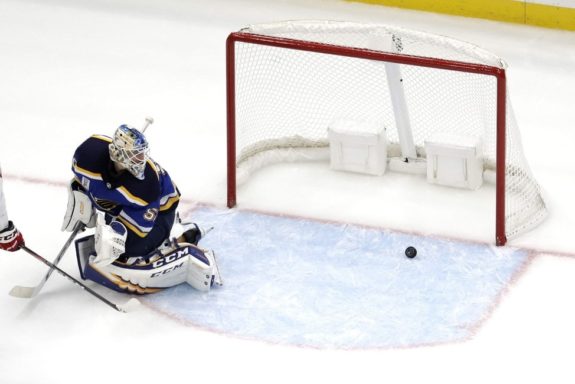The St. Louis Blues’ 2020-21 season had its highs and lows, but ultimately ended in disappointment after the team fell in four games to the Colorado Avalanche in Round 1. In this series, we’ll look back on the season player by player, and evaluate each player’s performance as an individual, with an eye towards their future with the team.
Since his headline-grabbing arrival in the 2018-19 season, Jordan Binnington has been one of the faces of the St. Louis Blues franchise. But entering the 2020-21 season after a disastrous performance in the playoff bubble the season prior, the third-year goaltender had a lot to prove. Though his season had its ups and downs, Binnington showed that he could be the steadying force the Blues need in net, and he cemented his long term future in the Gateway City.
What Went Right: Binnington’s Stellar Finish
Though Binnington struggled at times during the season, he was critical in the team’s turnaround from questioning their playoff spot to clinching it with ease several games before the end of the season. The goaltender seemed to wake up in a critical win against the Vegas Golden Knights on April 7, in which he made a career-high 50 saves (on 51 shots) and after which he created his latest viral moment, telling broadcaster Darren Pang “we’re coming.”
From that game on, Binnington was a different goalie, finishing the season with an 8-3-3 record and a .921 save percentage (SV%), with a goals-against average of roughly 2.42. Those aren’t the absurd numbers that he posted in his meteoric rise during his rookie season, but they are certainly good enough to remain among the best goaltenders in the league, and his strong performance helped the team establish itself and lay claim to the fourth playoff spot in the West Division.
Perhaps Binnington’s biggest personal accomplishment came off the ice, as the goaltender who once seemed destined for an American Hockey League career inked a six-year, $36 million contract extension. Initial returns after signing that deal were worrisome, as we’ll discuss shortly, but his strong final month and playoff performance reassured worried Blues fans that their team had committed to the right netminder.
What Went Wrong: Midseason Struggles
As we alluded to, Binnington’s worst stretch of the season by far came immediately after signing that contract. Between inking the deal on Mar. 12 and the aforementioned 50-save game on Apr. 7, the goaltender went 1-5-2 with an .895 SV% and a GAA of roughly 2.8. Those numbers helped lead the Blues to their most tenuous point in the season, neck and neck with the Arizona Coyotes for the final playoff spot. Fortunately, his swift turnaround quickly removed any doubt.

At season’s end, Binnington’s stats were average. He went 18-14-8 with a .910 SV%, a 2.65 GAA, and 2.5 goals saved above average (GSAA). He delivered a quality start 51.2% of the time he took the ice. Nothing jumps off the page at you. But his best moments were late in the season when the team needed him the most, and despite the regrettable outcome, he was the team’s best player in most of the postseason series against the Avalanche.
Key Stats
- Playoff SV%: .899
- .929 SV% and 2.09 GAA in winning performances
- T-2nd in the NHL in games played (42) and T-3rd in minutes (2448) amongst goaltenders
Final Grade: B
Binnington didn’t do quite enough to enter the 2020-21 season with no questions left. For some, there will always be doubts about a goaltender who rose from nowhere to NHL stardom. But the Richmond Hill, Ontario native’s late-season and postseason performance showed enough to justify the Blues’ faith in him. Plus, Binnington carried one of the heaviest workloads in the NHL, as backup goaltender Ville Husso struggled throughout the season. All-in-all, Binnington’s 2020-21 season was just fine.
What’s Next for Binnington?
Rarely in their franchise history has the Blues’ goaltending future seemed so clear. Binnington signed the longest contract ever given to a goalie by the Blues this season, and unless something significant changes, he will be one of the team’s goalies for the next six seasons. Eventually, he may have to fight off challenges from promising young goalies like Joel Hofer and Colten Ellis, but, for the time being, it’s his net and his alone.